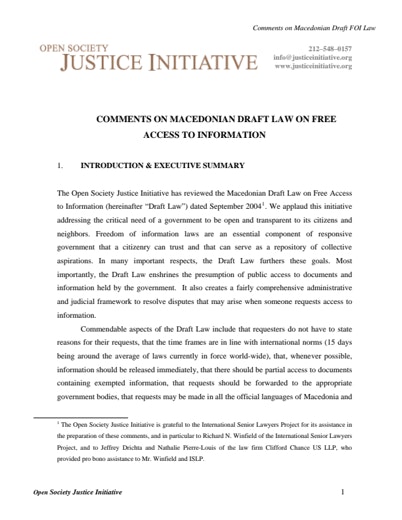Open Society Justice Initiative Comments on Macedonian Draft Law on Free Access to Information
The following comments to a draft Macedonian freedom of information law were submitted to the Macedonian Ministry of Justice in October 2004. The Ministry has indicated that it will produce a new draft incorporating the comments, which the Open Society Justice Initiative will be asked to review.
Executive Summary
The Open Society Justice Initiative has reviewed the Macedonian Draft Law on Free Access to Information (hereinafter "draft law") dated September 2004. We applaud this initiative addressing the critical need of a government to be open and transparent to its citizens and neighbors. Freedom of information laws are an essential component of responsive government that a citizenry can trust and that can serve as a repository of collective aspirations. In many important respects, the draft law furthers these goals. Most importantly, the draft law enshrines the presumption of public access to documents and information held by the government. It also creates a fairly comprehensive administrative and judicial framework to resolve disputes that may arise when someone requests access to information.
Commendable aspects of the draft law include that requesters do not have to state reasons for their requests, that the time frames are in line with international norms (15 days being around the average of laws currently in force worldwide), that, whenever possible, information should be released immediately, that there should be partial access to documents containing exempted information, that requests should be forwarded to the appropriate government bodies, that requests may be made in all the official languages of Macedonia, and that where documents exist in more than one language, the requestor shall have a choice. In addition, a number of welcome provisions will greatly facilitate the implementation of the law, including the establishment of information officers and of a national commission to oversee compliance with the law, obligations on information holders to ensure good records management, and a developed reporting structure to enable internal monitoring of use of the law.
Yet the draft law ultimately will not honor fully the spirit of the public right of access to information unless it addresses several of the issues we discuss below, two of which merit special mention here. First, we propose structural changes to the draft law to ensure that (a) all key terminology is properly and consistently defined, and (b) overlapping, and sometimes inconsistent, provisions are harmonized. Second, the provisions on exceptions need to be tightened and further clarified to reduce ambiguity in their interpretation by information holders and, ultimately, administrative and judicial officers who may have to review any denials of access. We discuss these and related comments below.
Finally, we suggest that the drafters consider including in this legislation provisions that would:
- Require a right of access to information held by private bodies that perform public functions;
- Impose on private bodies an obligation to publish information in the general public interest (e.g., concerning risks of harm to health, safety, or the environment) where necessary to protect citizens and consumers;
- Place a duty on public officials to assist requesters in order to ensure that users of the law are guided through its provisions and assisted with the formulation of clear requests;
- Provide protections for "whistleblowers"—those persons who in good faith release information about wrongdoing or a serious threat to health, safety, the environment, or human rights—against any legal, administrative or employment-related sanctions [an elaboration of Article 34 of the current draft];
- Ensure that all relevant staff in the information-holders receive sufficient training to be able to apply the law in line with both the letter and the spirit of the right of access to information.
The Open Society Justice Initiative is grateful to the International Senior Lawyers Project for its assistance in the preparation of these comments, and in particular to Richard N. Winfield of the International Senior Lawyers Project, and to Jeffrey Drichta and Nathalie Pierre-Louis of the law firm Clifford Chance US LLP, who provided pro bono assistance to Winfield and International Senior Lawyers Project.
Topics
- Climate Justice
- Digital Rights and Fair Elections
- Discrimination and Racial Justice
- International Crimes
